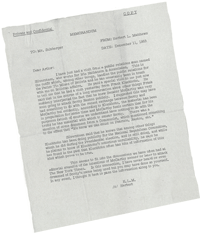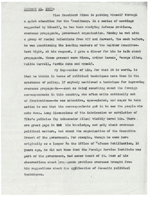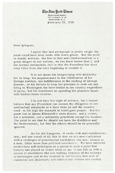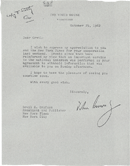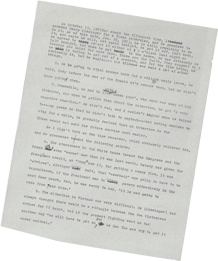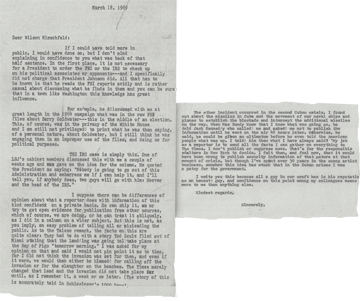
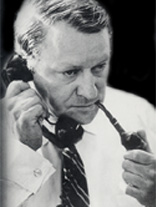

Washington Insider
It was during the presidency of Dwight Eisenhower that Reston began to achieve a real intimacy with the powerful men who ran the U.S. government. He had frequent private sessions with Secretary of State John Foster Dulles and often cabled the results of those background meetings directly to Arthur Hays Sulzberger in New York. It was Reston who eventually convinced Dulles to release the full record of the Yalta conference to the Times as a way of muting right-wing criticism that the U.S. had given away Eastern Europe at that summit meeting with the Soviets. The nation was, of course, obsessed throughout that period with Communism and with Communist subversion. Reston was critical of Eisen- hower's refusal to confront redbaiting Senator Joseph McCarthy directly and once characterized mild presidential criticism of the Wisconsin demagogue as "turning the other cheek." Reston's own columns and the Times' coverage played a key role in defrocking McCarthy.
Unlike his close friend, Washington Post publisher Philip Graham, Reston never fully warmed to John F. Kennedy. Reston disapproved of Graham's use of his newspaper to promote the Kennedy candidacy and found the glitz and arrogance of many around Kennedy offensive. Nonetheless, Reston clearly preferred Kennedy to Nixon, whom he did not then and never could abide. The brief Kennedy presidency is rich with examples of Reston's influence, access, restraint, and collaboration with the administration.
Early in his presidency, Kennedy went to Vienna for a summit meeting with the bombastic Soviet leader Nikita Khrushchev. While other reporters waited to hear the results of the meeting, Kennedy met privately with Reston in the American embassy. The young president was exhausted and discourag- ed. Kennedy told Reston, "He savaged me." Grimly and ominously, Kennedy said that in order to rebuild American credibility, he was going to have to be tougher on the Soviets, first in Berlin and probably in Vietnam as well. Thus, Reston was present at the beginning of what became America's disastrous involvement in Southeast Asia.
As the president had predicted, the confrontation with the Soviets over Berlin worsened in the fall on 1961. At a meeting with Kennedy at the president's compound in Hyannis, the president told Reston he was determined not to back down, but he didn't want to exacerbate the crisis by issuing strong public statements. It would be "helpful," Reston recalled the president saying, if Reston could write on his own authority that this was the government's posture. Reston wrote exactly that, allowing the White House to approve the language he used in his column. On the eve of the failed Bay of Pigs invasion in Cuba, Reston and then Times publisher Orvil Dryfoos agreed to a presidential request to tone down the story predicting the assault. And later, during the confrontation over the presence of Soviet offensive nuclear missiles in Cuba, the president again persuaded Reston and Dryfoos to hold off publication of the fact that Kennedy was about to institute a naval blockade of Cuba. In this instance, Reston got Dryfoos to extract a promise from Kennedy that as long as the Times remained silent, the government would "shed no blood and start no war."

University Archives, University of Illinois at Urbana-Champaign
